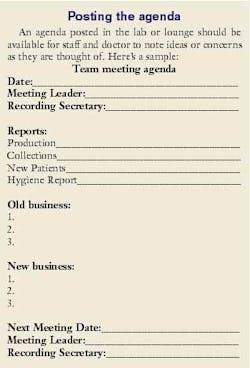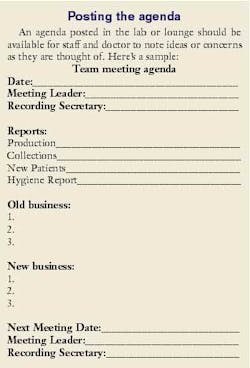Staff meetings
by Dianne Glasscoe
Dear Dianne,
I hate staff meetings! I have been working in my present practice for one year. When the doctor announces that we will be having a staff meeting on a particular day, I do not sleep well the night before. My stomach gets all tied up in knots, and I feel nauseated. My intense dislike for staff meetings stems from the unpleasant and uncomfortable discourse that always pervades our meetings. It seems like the doctor uses the occasion of staff meetings to berate one or several of us. For me, it is usually about my production and how it could/should be better. At one meeting, he told me in front of all my co-workers that several patients had complained about me. I was so embarrassed that I wanted to die! At another meeting, he picked on one of the chairside assistants. She is a little overweight, and he asked her if she had ever considered losing some weight!
It seems like nothing we do is ever good enough for this doctor, and he delights in telling us about it in staff meetings. I work very hard to do a good job for my patients, but I cannot remember a time when the doctor gave me a good word. If it were not for the wonderful patients and my great co-workers, I would leave this place!
Short of us all calling in sick on staff meeting days, is there any way to avoid these unpleasant meetings? Do I have to attend staff meetings?
Living in Dread
Dear Living,
What you have described totally misses the mark in what productive staff meetings are intended to do. Your staff meetings are nothing more than doctor gripe sessions with an element of verbal abuse. The mental image I get is that of a severe parent lining up the children to give them a swat with the leather strap to "keep them in line." It is easy to see why you dread these sessions. In fact, your practice would be better off not having staff meetings, at least until the doctor learns how to properly conduct a productive meeting.
Good team meetings should ultimately answer questions that make the practice a better place for patient care, a better place for people who work there, and more profitable and secure as a business.
Positive staff meetings should accomplish the following:
• Make the group more cohesive.
• Draw from the collective wisdom of the group to improve patient service.
• Allow staff members to be an integral part of running the business.
• Share business data related to production/collections and the "health" of the practice.
• Allow everyone to participate.
• Be a time to celebrate successes and make staff members and doctor/s feel good about being part of the group.
• Be a time of learning and sharing those things learned in continuing education courses.
Staff meetings should not:
• Become gripe sessions for either doctor or staff members. If someone presents a problem, he or she should also present a solution.
• Be unplanned.
• Allow any person to be singled out for correction in front of co-workers.
• Be dreaded by staff members or doctor/s.
• Be conducted after regular office hours.
There may be those in your practice who are good speakers and could present a program. These are usually very well received and are good for a change. Also, bringing in an outside speaker, such as a local orthodontist or oral surgeon, can make meetings interesting.
Every effort should be made to make staff meetings upbeat and informative. No idea is discounted, and brainstorming results in some wonderful plans for action.
Here are some things that can sabotage staff meetings:
• No clear purpose. What is the meeting intended to accomplish? Good staff meetings need to be planned ahead with a specific agenda. A staff meeting agenda should be posted for all to see before the meeting so people have time to prepare.
• Not enough time allowed. Staff meetings should be held on company time and pre-blocked in the schedule. If staff meetings are held at lunch, I recommend at least the first 30 minutes be for eating and the next hour be reserved for business. If only an hour is allotted, it is difficult for people to eat and properly discuss business at the same time. Most staff members and doctors appreciate the lunch break as a time to relax before the afternoon begins. Therefore, business should not be conducted while people are eating.
• Staff resentment. Staff members resent meetings that cause them to use their lunch hour to conduct practice business, especially if it is uncompensated. Further, if the meeting degrades into character attacks or other negative discussion, staff members will come to dread and resent future meetings. Having staff members present who do not want to be there is counterproductive. Just like a painful dental experience can cause a patient to equate future dental visits with pain and unpleasantness, the same can happen with staff members and staff meetings. Every attempt should be made to keep meetings helpful, positive, fun, and productive.
• Negativism and lack of acceptance. All ideas brought to the table should be considered, and no one should be put down by anyone else. Open lines of communication and mutual respect are necessary to keep active discussion flowing.
I think it is a good idea for management to take the staff members out to lunch at least twice a year for the meeting. At these meetings, cover the vital statistics, but let the meeting be more about enjoying a good meal together and camaraderie.
In your present situation, the doctor sounds like a person who is lacking tact and sensitivity. Further, he appears to have "control" issues, which is why he majors on finding fault with the staff members. He is shooting himself in the foot with his staff meetings by using them as an occasion to berate or belittle those who work there. Issues with staff performance should be handled one-on-one and never in the presence of others. Comments about staff members' physical weight are very inappropriate and border on harassment. Hygiene department production is a legitimate topic for discussion in a staff meeting, but you should not be singled out or embarrassed for any reason in a staff meeting, whatever the topic.
The staff meetings you describe do not meet any of the criteria for a positive and productive staff meeting. Quite the opposite — the result is that staff members resent and dread the occasion, which is unfortunate. The doctor is doing more harm than good. Until your doctor learns how to conduct a staff meeting, things will not change.
Time spent working on the business is just as important as time spent working in the business. Team meetings should be productive and enjoyable. These meetings provide a time to improve and fine-tune the business.
I have an idea. Make a copy of this article, give it to the doctor, and say, "I could have written this."
Best wishes,
Dianne
Dianne D. Glasscoe, RDH, BS, is a professional speaker, writer, and consultant to dental practices across the United States. She is CEO of Professional Dental Management, based in Frederick, Md. To contact Glasscoe for speaking or consulting, call (301) 874-5240 or email [email protected]. Visit her Web site at www.pro fessionaldentalmgmt.com.
The most positive staff meetings are participatory, and everyone is allowed to contribute. Here are some suggestions for how different staff members can participate.
Doctor:
a. Last month's production compared with last year's, same month.
b. Last month's collections compared with last year's, same month.
c. Average dollars per day produced and collected. (Add monthly production and collections. Divide by two. Divide by the number of days worked.)
Appointment coordinator:
a. Total number of patients seen last month.
b. Number of new patients last month.
c. Number of emergency patients.
d. Number of broken or changed appointments.
Dental assistants:
a. Dental supply percentage (total amount spent on dental supplies last month divided by collections for month). Should be 5 to 7 percent of gross collections.
b. Number of units of crown and bridge prepared last month with comparison of last year's same month.
Hygiene department:
a. Number of hygiene days last month.
b. Average number of patients seen per day by hygiene department.
c. Average dollars per day produced last month by hygiene department.
d. Number of broken appointments or units of wasted chair time.
Financial coordinator:
a. Accounts receivable update.
b. Any dental insurance updates.
c. Number of delinquent account calls made.
d. Amount collected as a result of those calls.

